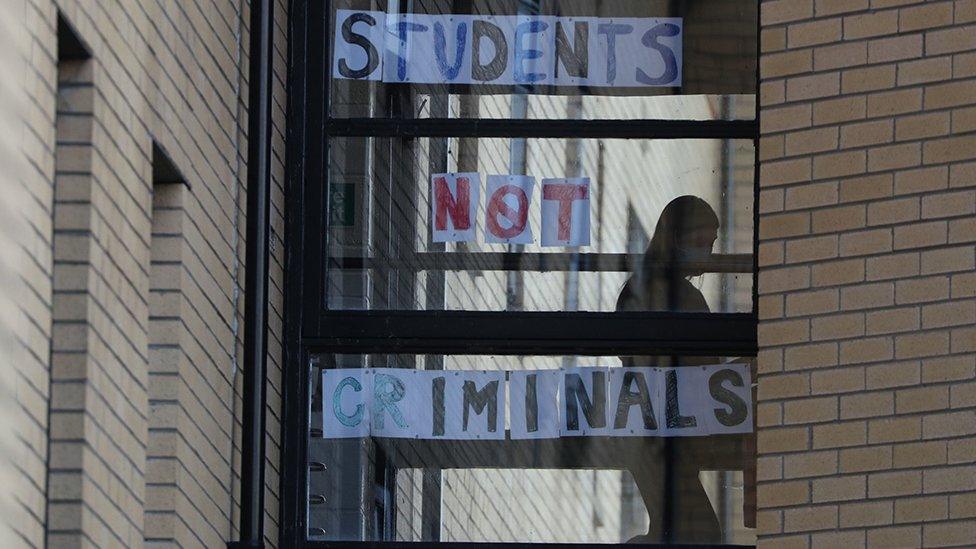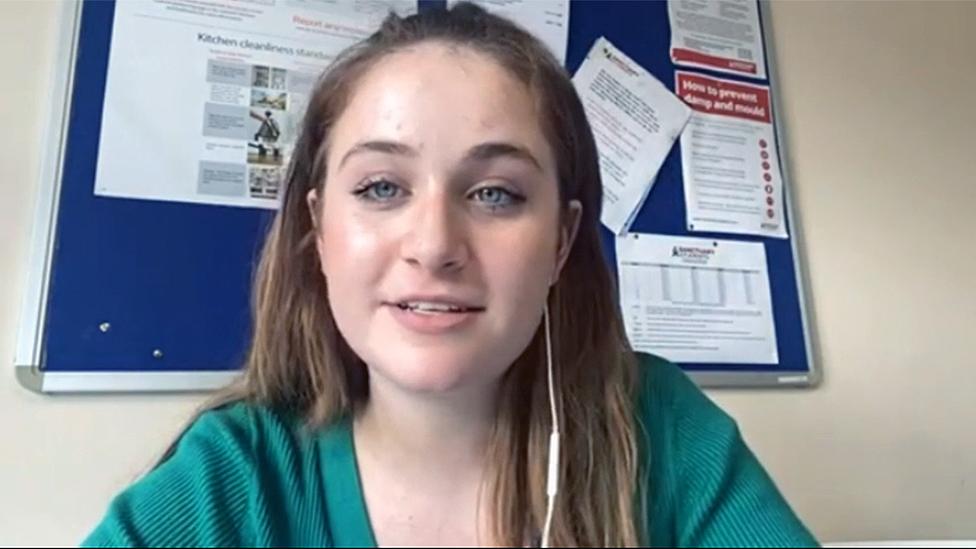Covid-19 in Scotland: Sharp spike in infections among teenagers
- Published

More than 1,000 students across Scotland are now believed to be in self-isolation in halls of residence
The Covid-19 outbreak in Scotland is now being driven by infections among teenagers, figures show.
More than 43% of the positive cases detected on Thursday were in the 15-19 age group, according to data published by Public Health Scotland, external.
Infection rates in this age group were stable throughout the summer, but began to rise sharply from mid-September.
Public health teams are dealing with several outbreaks among students living in shared accommodation.
The largest outbreak is at the University of Glasgow, where 172 students have tested positive.
There are also clusters of cases among students in Dundee, Edinburgh and Aberdeen. More than 1,000 students across the country are now believed to be self-isolating.
The Scottish government reported 344 new positive cases on Sunday, down from a rise of 714 on Saturday.
One further death following a positive test was registered and the number of people in hospital with recently confirmed Covid-19 increased by six.
On 24 September, 43.3% of infections were in the 15-19 age group, with 18.7% in 25 to 44 year olds and 17.2% in 20 to 24 year olds.
Positive cases among the oldest age groups remain very low.

Although the 15-19 range will include infections in school-age children as well, it is likely most positive cases are at the upper end of the group - many of whom started university two weeks ago.
Tessa Mairi Morrison, a Glasgow University fresher student who tested positive, said morale among her flatmates was low.
"Four of us have been tested positive, two people have been tested negative and the rest haven't been tested," she told the BBC's Politics Scotland show.
"And we can't social distance in the flat either, it's impossible. We've got a small kitchen and there's 11 of us cooking at the one time.
"So the people who don't have coronavirus are going to get it."

Tessa Mairi Morrison: "Impossible" to social distance in a student flat
Ms Morrison said she believed it was a "mistake" to put people into halls of residence.
"Maybe they should have tested everyone beforehand, before putting us into halls, or strictly containing it in halls without spreading it to the rest of Glasgow - or even putting us in halls in December, because this is a bit of a nightmare," she added.
Students are banned from returning home under Scottish Covid-19 regulations because they are deemed to have formed a new household with the people they are now living with.

How are infection rates changing among age groups?
Since 1 August, the infection rates in younger age groups have been higher, with rates in the over-65s very low.
The highest rate has generally been in the 20-24 age group, but there was a significant change in mid-September.

The chart illustrates this by taking the average number of infections from the previous seven days and dividing it by the population of the age group.
On 24 September, the rate per 100,000 in the 15-19 age group stood at 48.7. The rate for the next highest group (20-24 year olds) was 18.5.

Deputy First Minister John Swinney said the Scottish government's advice to all students was to stay in their halls of residence "if they are able to do so".
"That's to ensure that we minimise the spread of the virus around the country," he told BBC Scotland.
"It's important that any student who is self-isolating - or students in general who are in halls in the situation that they are facing - are given the full and proper support of the university or the college that is supporting them.
"That's obviously an issue that we've prioritised in our discussions with universities in the course of the last few days."

